Automobiles
Hyundai to spend $18 bn on EVs; Kia breaks ground on first PBV plant
The carmakers are upping the ante with increased investment to join the world’s top 3 EV players by 2030
By Apr 11, 2023 (Gmt+09:00)
3
Min read
Most Read
LG Chem to sell water filter business to Glenwood PE for $692 million


Kyobo Life poised to buy Japan’s SBI Group-owned savings bank


KT&G eyes overseas M&A after rejecting activist fund's offer


StockX in merger talks with Naver’s online reseller Kream


Mirae Asset to be named Korea Post’s core real estate fund operator


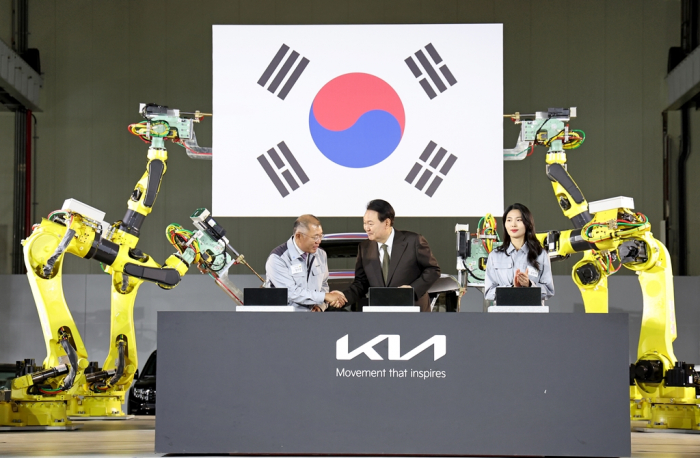
South Korea’s largest automaker Hyundai Motor Group has unveiled its 2030 vision to become one of the world’s top three electric vehicle makers with a 24 trillion won ($18.2 billion) investment in Korean facilities.
As part of the goal, the automotive group’s affiliate Kia Corp. on Tuesday broke ground on its first electric purpose-built vehicle factory at its Hwaseong complex, south of Seoul, which would also mark the group’s first car manufacturing plant to be constructed in Korea in nearly three decades.
With Korean President Yoon Suk Yeol as well as Hyundai executives, including Chairman Chung Euisun and Kia Chief Executive Song Ho-sung in attendance, Kia has begun construction work on the new plant with an aim to start commercial production of PBVs in the second half of 2025.
Once up and running, the 1 trillion won ($757 million) EV factory will have an annual production capacity of 100,000 vehicles and can be expanded to 150,000 units later, Kia officials said.
“We will help Korea leap forward to become one of the top three global future car makers,” President Yoon said at Kia’s ground-breaking ceremony. “The government will work with Hyundai Motor Group as one team so that the carmaker can lead the mobility innovation worldwide.”
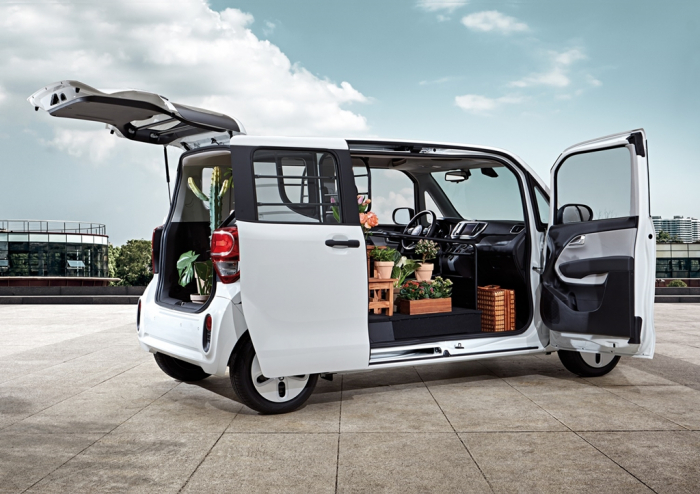
Hyundai Motor Group last constructed a domestic car manufacturing plant, Hyundai Motor Co.'s Asan factory, in 1994.
Hyundai Motor and Kia, which rank first and second, respectively, in terms of car sales in Korea, are combined one of the world’s top five carmakers. The duo has manufacturing facilities across the globe, including in the US and Europe.
LEADING HYUNDAI’S PBV PROJECTS
Kia, which is leading Hyundai Motor Group’s PBV projects, aims to become the world’s top PBV player by 2030 by launching various custom-tailored vehicles.
The market for personalized vehicles has huge growth potential as such cars can be used for various purposes such as public transportation, clinics, cafes, living space and freight transfer.
Kia has already signed business agreements with Coupang Inc. and CJ Logistics Corp. to build custom-tailored vehicles for product delivery.
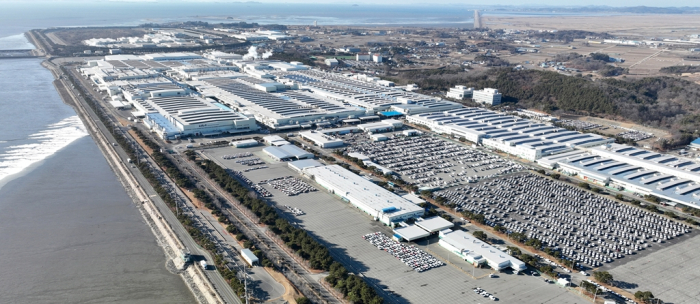
Kia’s PBV business is integral to its future mobility strategy dubbed Plan S, a plan for a shift toward future mobility. The company expects purpose-built vehicles to account for about a quarter of its cars sold globally by 2030, according to Kia CEO Song.
Last year, he said the company would be reborn as a first-mover instead of a fast-follower in the era of future mobility by focusing on electric vehicles, particularly the emerging segment of purpose-built vehicles.
Kia plans to build a dedicated PBV platform, called skateboard, at the Hwaseong complex.
Besides the first dedicated EV plant in Korea, Kia said it will also push to revamp its existing domestic facilities to produce electric vehicles.
The automaker said it will unveil a micro PBV optimized for the delivery of parcels or foods, a mid-sized robotaxi model and a large PBV that can replace existing buses and be used as multi-seater shuttles or mobile offices.
According to the Hyundai Motor Group, its two car-making affiliates aim to expand their EV lineup to 31 models by 2030, including Kia’s largest SUV EV9 this year and Hyundai’s IONIQ 7 in 2024.
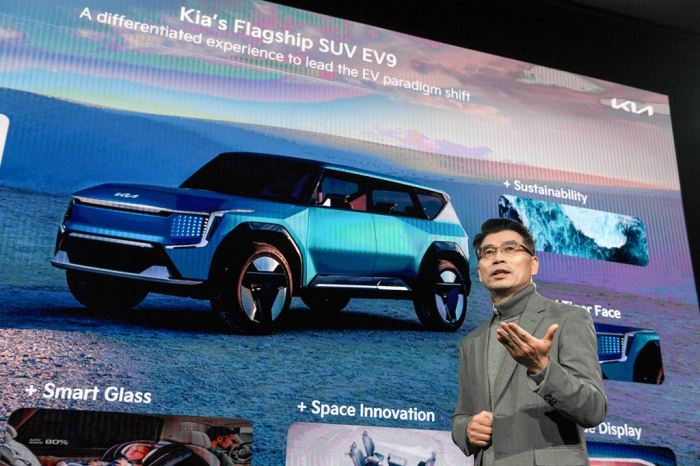
UPPING THE ANTE
The automotive group’s 24 trillion won investment plan is a 3 trillion won increase from its original plan announced last year, a move that shows its determination to enhance its presence in the global EV market.
With the increased spending, Hyundai plans to raise its domestic EV production volume fivefold to 1.51 million vehicles by 2030 from 330,000 units in 2022.
Of the total, exports will increase by fourfold to 920,000 cars by 2030 from last year.
The automaking group aims to produce 3.64 million EVs a year globally, including local production, by 2030.
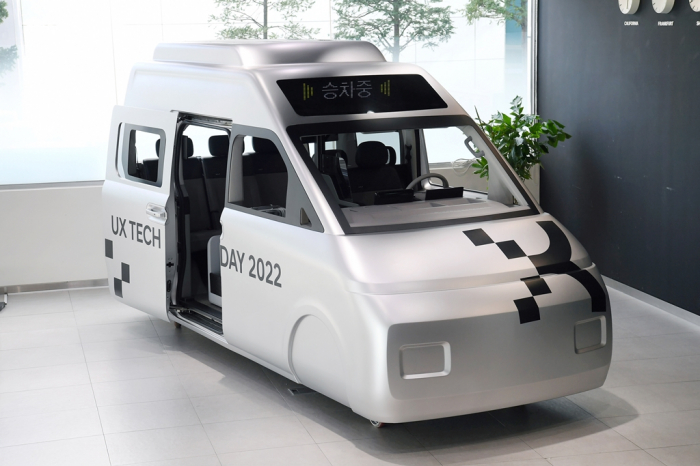
“The government will spare no effort in supporting local carmakers’ moves to embrace the industry’s paradigm shift toward future mobility,” President Yoon said.
The government plans to announce support measures to nurture the local automotive ecosystem by the end of the first half.
The measures will include expanded R&D spending for auto parts makers, tax breaks and state funding, officials said.
Write to Il-Gue Kim and Byung-Uk Do at Black0419@hankyung.com
In-Soo Nam edited this article.
More to Read
-
 Electric vehiclesKia EV9 boasts 336-mile target range in digital world premiere
Electric vehiclesKia EV9 boasts 336-mile target range in digital world premiereMar 29, 2023 (Gmt+09:00)
2 Min read -
 Electric vehiclesKia’s EV6 GT: Faster than supercars Lamborghini, Porsche and Ferrari
Electric vehiclesKia’s EV6 GT: Faster than supercars Lamborghini, Porsche and FerrariSep 29, 2022 (Gmt+09:00)
1 Min read -
 AutomobilesKia chooses Coupang as first partner for purpose-built vehicle rollout
AutomobilesKia chooses Coupang as first partner for purpose-built vehicle rolloutApr 15, 2022 (Gmt+09:00)
2 Min read -
 AutomobilesKia set to break ground on purpose-built vehicle plant in 2023
AutomobilesKia set to break ground on purpose-built vehicle plant in 2023Mar 30, 2022 (Gmt+09:00)
2 Min read -
 Chief ExecutivesKia aims to become purpose-built vehicle market leader: CEO
Chief ExecutivesKia aims to become purpose-built vehicle market leader: CEOFeb 02, 2021 (Gmt+09:00)
4 Min read
Comment 0
LOG IN


